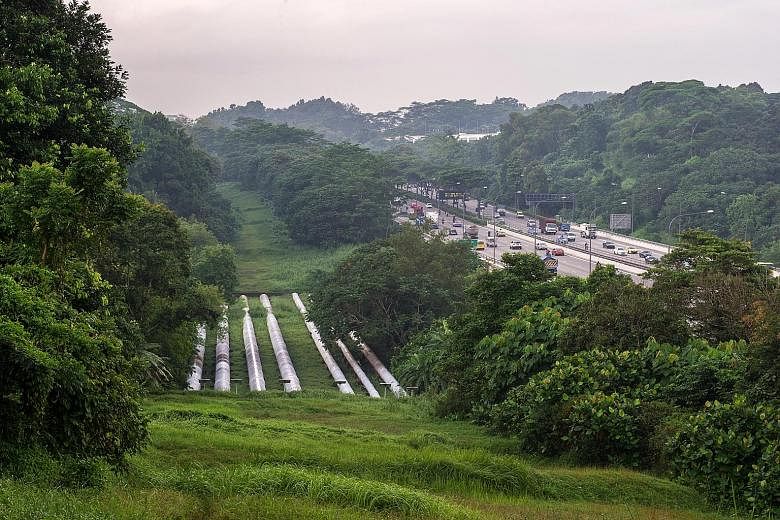It was water, water everywhere - and precious little relief for local businesses as more than half the 17 MPs who debated Budget 2017 yesterday voiced concerns about how the upcoming hike in water prices will hurt companies here.
As part of plans to prepare Singapore for an uncertain future economy, Finance Minister Heng Swee Keat on Monday last week used the Budget speech to raise tariffs for water, diesel and carbon emissions, in a bid to preserve the country's sustainability and livability.
For small and medium-sized enterprises (SMEs) that expected - but had not received - handouts or subsidies in the Budget to deal with the already challenging economic environment, the higher costs were a big blow, MPs said.
Indeed, Mr Lim Biow Chuan (Mountbatten) said that apart from the price hikes, "for most of the smaller businesses, this year's Budget is a non-event".
He added that consumers felt the same way. "When I go for feedback sessions, everybody's first question is on the water prices."
The price of water will go up by 30 per cent over two years, while diesel duties will be restructured to tax usage more heavily, raising transport costs. A carbon tax will also start from 2019, and is likely to push up electricity prices.
Some MPs yesterday were worried about the effect that these moves would have on consumers, especially middle-income households who do not qualify for subsidies. Workers' Party MP Pritam Singh (Aljunied GRC) asked for more details on the considerations behind the water price hike, in particular, and suggested other strategies for reducing water consumption.
But most of the MPs focused on how the "dramatic" increase in water prices - as the WP's Non-Constituency MP Dennis Tan put it - would further squeeze SMEs struggling under the relatively high manpower and rental costs.
Mr Lim urged the Government to delay the rise in water prices until next year, partly to refocus the Budget message on restructuring Singapore's economy for the future, and also given the current climate of economic uncertainty.
He was not the only MP to touch on the timing of the price rise. NCMP Leon Perera, from the WP, was blunt in his assessment that the "timing of these price hikes seems more synchronised to the political cycle than to the economic cycle".
Raising prices now "may make good political sense because people have three years to forget them" before the next general election, he said, but they come "at the time of relative economic fragility when they could tip some SMEs at the margins over the edge".
While most SMEs will actually suffer only minimal pain from the water price hike - three-quarters of businesses will pay less than $25 a month more - the loud protests reflect the heavy cost burdens companies already shoulder, and the difficulties they face in raising their revenues in a small and competitive market.
Land and rental costs, while gradually coming down, are still elevated, compared with the rest of the region. Manpower costs have also soared amid the tightening of foreign labour inflows and the ongoing productivity drive.
Most recently, companies have complained of rising compliance costs with the introduction of new regulations. And in last week's Budget speech, hints of new or higher taxes stoked fears of even more cost burdens to come.
Keeping Singapore business-friendly in an increasingly competitive landscape will require a serious analysis of how this high cost structure across the economy can be reduced.
As Nominated MP Thomas Chua, who is also president of the Singapore Chinese Chamber of Commerce and Industry (SCCCI), said: "Countries which were previously more advanced than we were are becoming even less expensive; countries which were less expensive than we were have become more advanced."
Singapore will have to become more productive and cost-efficient to remain competitive.
MPs were free with their suggestions on how to mitigate cost increases for companies. Mr Liang Eng Hwa (Holland-Bukit Timah GRC) and Ms Foo Mee Har (West Coast GRC), for instance, proposed subsidised rental rates for start-ups to operate on state-owned land or unused buildings.
This could help first-time entrepreneurs kick-start their businesses and sustain a vibrant, diverse ecosystem of micro SMEs.
Larger firms, though, will need more than a temporary cost fix to survive. They need a bigger and bolder strategy to help them seize opportunities to grow their revenues - thereby boosting their profit margins and keeping them viable in the long run.
Minister for Trade and Industry (Industry) S. Iswaran wisely focused on this in his contribution to the Budget debate yesterday.
He reiterated the growing sectors in the region where SMEs can expand, by making use of Singapore's existing strengths, such as healthcare, infrastructure and urban solutions, as well as by tapping the vast opportunities in the digital economy.
He also spoke about how the Government is helping SMEs take advantage of these chances. It is offering grants to grow overseas - both organically and through acquisitions - and to help SMEs get the necessary loans to expand and take on more and larger projects.
It also introduced new schemes in this year's Budget to help companies create new products and services, raise productivity, enter the digital economy and develop talent, he said.
While it is crucial to manage the bottom line, there is a limit to the amount of costs that can be reduced in a resource-scarce country like Singapore. Finding more sources of revenue through new products and new markets will be the only way for SMEs to grow.



